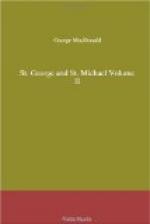To many a sermon, cleric and lay, had he listened since he left that volume there—in church, in barn, in the open field—but the religion which seemed to fill all the horizon of these preachers’ vision, was to him little better than another tumult of words; while, far beyond all the tumults, hung still, in the vast of thought unarrived, unembodied, that something without a shape, yet bearing a name around which hovered a vague light as of something dimly understood, after which, in every moment of inbreaking silence, his soul straightway began to thirst. And if the Truth was not to be found in his own heart, could he think that the blows by which he had not gained her had yet given her?—that through means of the tumult he had helped to arouse in her name and for her sake, but in which he had never caught a sight of her beauteous form, she now sat radiantly smiling in any one human soul where she sat not before?
Or should he say it was Freedom for which he had fought? Was he then one whit more free in the reality of his being than he had been before? Or had ever a battle wherein he had perilled his own life, striking for liberty, conveyed that liberty into a single human heart? Was there one soul the freer within, from the nearer presence of that freedom which would have a man endure the heaviest wrong, rather than inflict the lightest? He could not tell, but he greatly doubted.
His thought went wandering away, and vision after vision, now of war and now of love, now of earthly victory and now of what seemed unattainable felicity, arose and passed before him, filling its place. At length it came back: he would glance again into his cousin Thomas’s book. He had but to stretch out his hand to take it, for his bed was close by the window. Opening it at random, he came upon this passage:
And as the Mill, that circumgyreth fast, Refuseth nothing that therein is cast, But whatsoever is to it assign’d Gladly receives and willing is to grynd, But if the violence be with nothing fed, It wasts itselfe: e’en so the heart mis-led, Still turning round, unstable as the Ocean, Never at rest, but in continuall Motion, Sleepe or awake, is still in agitation Of some presentment in th’ imagination.
If to the Mill-stone you shall cast in Sand, It troubles them, and makes them at a stand; If Pitch, it chokes them; or if Chaffe let fall, They are employ’d, but to no use at all. So, bitter thoughts molest, uncleane thoughts staine And spot the Heart; while those idle and vaine Weare it, and to no purpose. For when ’tis Drowsie and carelesse of the future blisse, And to implore Heav’n’s aid, it doth imply How far is it remote from the most High. For whilst our Hearts on Terrhen things we place, There cannot be least hope of Divine grace.
‘Just such a mill is my mind,’ he said to himself. ’But can I suppose that to sit down and read all day like a monk, would bring me nearer to the thing I want?’




